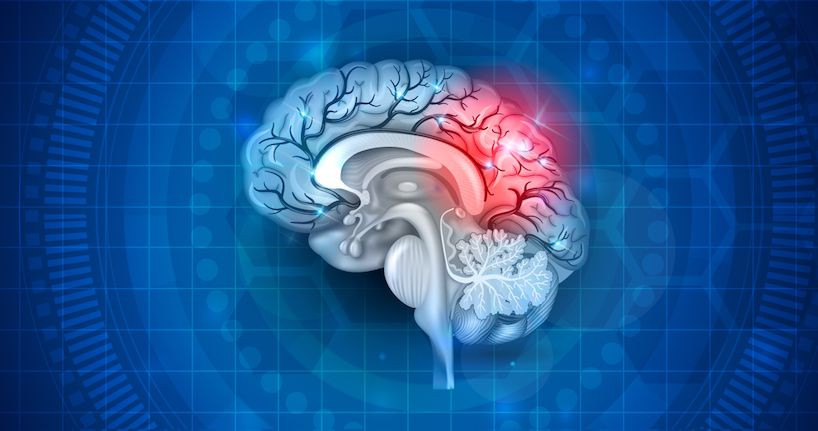12 Likely Symptoms of Post-Concussion Syndrome
Following a concussion (also known as a mild traumatic brain injury), many people experience lasting symptoms in what is often referred to as "post-concussion syndrome." However, the symptoms themselves can manifest in different ways for different patients, which makes post-concussion syndrome particularly difficult to diagnose. Below we list some of the most common physical, cognitive and emotional issues you should watch out for if you recently experienced a head injury.
- Headaches and Migraines
- Dizziness and Vertigo
- Fatigue
- Sensitivity to Light
- Blurred Vision
- Noise Sensitivity
- Difficulty Concentrating
- Memory Loss
- Slow / Delayed Thinking
- Anxiety
- Depression
- Sleep Disturbances

Physical Symptoms
Headaches and Migraines
Headaches and migraines rank as one of the most common complaints of post-concussion syndrome, affecting as many as 90% of patients at all stages of the condition. Unfortunately, these headaches can last anywhere from 3 to 6 months to over 1 year, and you are more likely to experience chronic headache issues if you or your family have a prior history of headache or migraine disorders and/or if you have experienced multiple head injuries previously.
Dizziness and Vertigo
The first few days after a head injury is where a majority of people deal with post-concussion dizziness, however it can become a chronic problem for some—lasting up to five years or more. Dizziness and vertigo may also be accompanied by feelings of faintness, lightheadedness, nausea and/or vomiting.
Fatigue
More than 90% of patients report moderate to severe fatigue following a concussion, and it can linger even when most other symptoms have subsided. Although there is plenty of debate surrounding how much exertion should take place for a person with post-concussion syndrome, it is still recommended to get plenty of rest—particularly in the early days after the injury.
Sensitivity to Light
Persistent light sensitivity is another frequent side effect that can be a hallmark of post-concussion syndrome, although it may be underreported in medical studies. Like many other symptoms described here, this sensitivity to light can last beyond the initial recovery period of a concussion. Additionally, many patients report that their post-concussion symptoms are triggered by certain light, such as fluorescents or digital screens.
Blurred Vision
Blurred vision represents a common visual symptom after a head injury, with nearly half of non-recovered post-concussion patients citing it as a disruption. Fuzziness in the visual field may be physiological in nature, due to injury sustained by the brain and how it affects the eyes, or it may even represent a neurological complication of the TBI or concussion (e.g. caused by vestibular migraine).
Noise Sensitivity
Sometimes even the quietest sounds can be painful for a person with post-concussion syndrome. In fact, research has shown that approximately 40% of head injuries have enduring noise sensitivity as a follow-on symptom, and often it presents with other sensory issues such as photophobia and light intolerance.

Cognitive Symptoms
Difficulty Concentrating
If you are dealing with ongoing post-concussion symptoms, it is very likely that you will also experience disruption in your ability to concentrate. In fact, it is perhaps the most common non-physical symptom related to concussions and head injuries. Difficulty concentrating may stem from neck pain, visual changes, changes in nerve structure, as well as psychological symptoms like anxiety, and noise/visual sensitivities.
Memory Loss
Post-concussion syndrome can unfortunately lead to memory loss or brain fog for perhaps as many as three out of four individuals who live with the condition. This might be set off by any brain bruising associated with the offending injury or simply related to other symptoms like poor concentration, migraine and/or fatigue.
Delayed/Slowed Thinking
As with concentration difficulties, thinking problems are a common feature of head injuries, and they are often associated with delayed ability to respond and attention deficits. These symptoms are most frequently reported within the first 3 months after a concussion, and longer-term cognitive problems are likely due to an underlying prevalence of emotional symptoms, specifically depression.

Emotional Symptoms
Anxiety
Anxiety is sadly a regular feature of chronic and invisible illness, including post-concussion syndrome, and it can be especially high if an individual also experiences sensory issues such as light or sound sensitivity. (Hint: You can read more about light sensitivity and anxiety here.) What is even worse is that anxiousness after a concussion can lead to a negative cycle of behavior for patients, such as having reduced hope about their prospects of recovery.
Depression
Depression often accompanies anxiety and other emotional problems following a concussive injury. In fact, nearly 50% report depression within the first year following an injury. And it can be hard to shake, lasting for several years after the initial concussion. This can prolong recovery time and also lead to worsening outcomes and symptoms. It is imperative to discuss any emotional side effects with a medical professional in order to help reduce the negative impact on your recovery and life.
Sleep Disturbances
Sleep disturbances may affect 40% to 75% of patients following their injury and may be manifested in symptoms of insomnia and other sleep challenges. Other sleep disorders may be present in those with a mild traumatic brain injury as well, such as hypersomnia, periodic limb movement disorder (PLMD), narcolepsy, sleep walking, sleep terrors, REM sleep disorders and more.
Want more insight into specific symptoms of post-concussion syndrome? Check out the links below to read more!
Additional Reading:
Light Sensitivity after a Concussion
Dizziness and Vertigo from Post-Concussion Syndrome
7 Common Eye Symptoms of Concussion
References:
Recovering from a mild traumatic brain injury. Brain Injury Rehabilitation Service Concussion Clinic, Burwood Hospital. 13 March 2012. Retrieved from: http://bianj.org/wp-content/uploads/2014/10/recoveringfrommildtbi.pdf
Sharp DJ, Jenkins PO. Concussion is confusing us all. Practical Neurology. 2015;15(3):172-186. doi:10.1136/practneurol-2015-001087.
Lucas S. Characterization and Management of Headache after Mild Traumatic Brain Injury. In: Kobeissy FH, editor. Brain Neurotrauma: Molecular, Neuropsychological, and Rehabilitation Aspects. Boca Raton (FL): CRC Press/Taylor & Francis; 2015. Chapter 13.
Davies RA, Luxon LM. Dizziness following head injury: a neuro-otological study. J Neurol. 1995 Mar;242(4):222-30.
Snell DL, Martin R, Macleod AD, Surgenor LJ, Siegert RJ, Hay-Smith EJC, Melzer T, Hooper GJ, Anderson T. Untangling chronic pain and post-concussion symptoms: the significance of depression. Brain Inj. 2018;32(5):583-592. doi: 10.1080/02699052.2018.1432894. Epub 2018 Feb 1.
Viola-Saltzman M, Watson NF. Traumatic Brain Injury and Sleep Disorders. Neurologic clinics. 2012;30(4):1299-1312. doi:10.1016/j.ncl.2012.08.008.
Ryan LM, Warden DL. Post concussion syndrome. Int Rev Psychiatry. 2003 Nov;15(4):310-6.

TheraSpecs® Glasses for Light Sensitivity
Find the glasses that fit your needs and lifestyle, and stay protected from screens, fluorescents, unwanted blue light, sunlight, flashing lights, and more.
Shop Now



